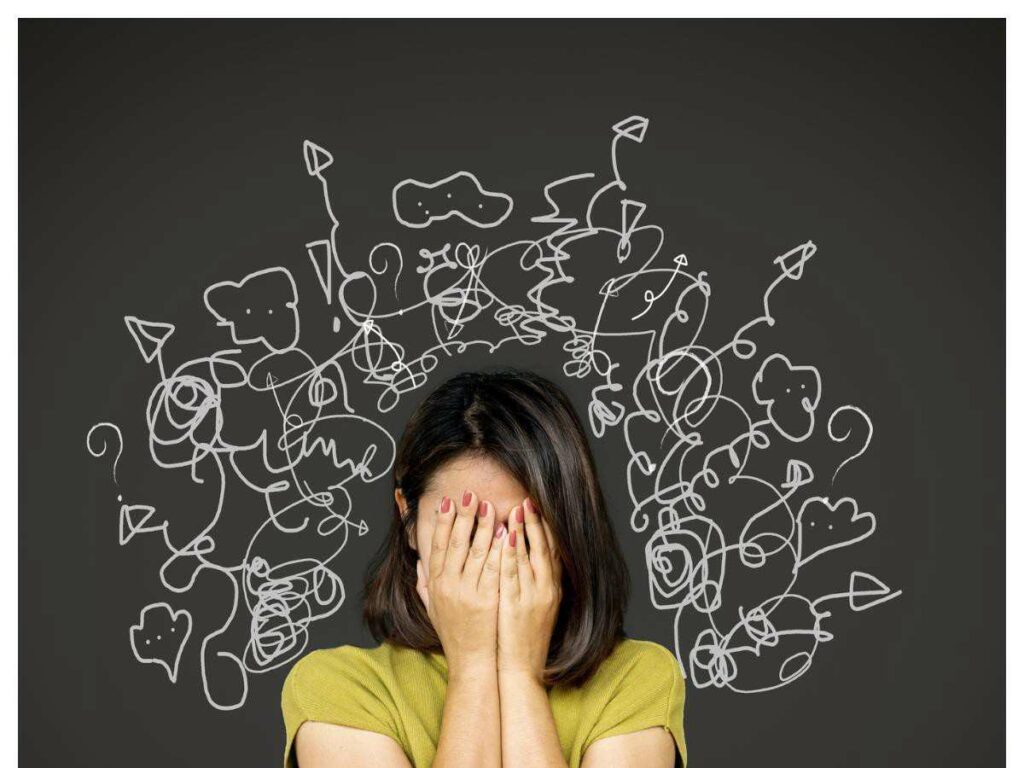Depression is a mental health disorder that involves persistent feelings of sadness and despair. For those who experience intrusive thoughts depression, these negative thoughts can be incredibly difficult to control. If you are struggling with these conditions, don’t worry – you are not alone. In this blog post, we will discuss some tips for controlling intrusive thoughts and managing depression.
Contents
- 1 What Are Intrusive Thoughts?
- 2 What Is Depression?
- 3 Can Depression Make You Have Intrusive Thoughts?
- 4 Example Of Depression And Intrusive thoughts
- 5 Link Between Intrusive Thoughts And Depression
- 6 What Causes Horrible Intrusive Thoughts And Depression?
- 7 Is There A Diagnosis For Intrusive Thoughts Or Depression?
- 8 How Do I Stop Intrusive Depressive Thoughts?
- 9 Conclusion
What Are Intrusive Thoughts?
Intrusive thoughts are unwanted, unpleasant, or distressing thoughts or images that can enter a person’s mind and cause distress. They can include thoughts about self-harm, violence toward others, suicidal ideation, and/or other disturbing topics. Intrusive thoughts are common in people with depression, as well as those who have anxiety disorders.
What Is Depression?
Depression is a mental health disorder that involves persistent feelings of sadness, hopelessness, and worthlessness. It can also involve physical symptoms such as fatigue and loss of appetite. People with it often experience difficulty concentrating, sleeping, and socializing. They may also have trouble getting motivated to do even simple tasks like going for a walk or preparing meals.
Can Depression Make You Have Intrusive Thoughts?
Yes, depression can make a person more likely to experience intrusive thoughts. People with depression often experience negative thinking patterns such as rumination, which is the tendency to dwell on depressing or anxious thoughts. This can lead to an increase in unwanted and distressing thoughts that are difficult to control.
Example Of Depression And Intrusive thoughts

For example, a person with depression may find themselves stuck in a loop of ruminating on the same negative thought over and over. This can lead to feelings of despair and hopelessness, as well as an inability to move forward or make decisions. Additionally, people with depression often have difficulty sleeping which can result in more intrusive thoughts due to fatigue and lack of rest. Here are some types of intrusive thoughts:
- Fear that something bad will happen
- Worries about being judged or rejected
- Uncontrollable or repetitive thoughts
- Obsessive fears and worries.
- Delusional and intrusive sexual thoughts.
- Fantasies or thoughts of harming yourself or others.
Link Between Intrusive Thoughts And Depression
The link between intrusive thoughts and depression is well established.
Similarities
Here are some similarities between the two including a feeling of being overwhelmed, difficulty concentrating and sleeping, intrusive and negative thoughts as well as feelings of worthlessness. People with depression often experience an increase in intrusive thoughts and this can lead to further depressive symptoms such as anxiety, helplessness, or despair.
Depression can lead to an increase in unwanted and distressing thoughts, as well as physical symptoms such as fatigue, which can make it more difficult for a person to control their thoughts. Additionally, people who have depression often experience difficulty concentrating and sleeping which can further exacerbate intrusive thoughts.
Differences
There are also some differences between intrusive depressive thoughts. Intrusive thoughts can be fleeting, while depression is a more persistent state of feeling down or hopeless. Also, individuals with depression may have additional symptoms such as suicidal ideation or thoughts of self-harm which are not typically associated with intrusive thoughts.
What Causes Horrible Intrusive Thoughts And Depression?

There are several psychological and biological factors that can contribute to depression and intrusive thoughts.
- Genetics: Research has shown that depression can have a genetic component, meaning that certain people may be predisposed to developing the disorder. It means that a person with a family history of depression may be more likely to experience symptoms
- Environmental: Difficult life experiences such as the death of a loved one or job loss can trigger depressive episodes. Stress and traumatic events can also predispose an individual to develop depression. Isolation and loneliness can further exacerbate depression. PTSD and anxiety disorder can also lead to intrusive depressive thoughts.
- Biological: Neurotransmitters such as serotonin, dopamine, and noradrenaline help regulate mood. An imbalance of these chemicals in the brain can lead to depression.
Is There A Diagnosis For Intrusive Thoughts Or Depression?
Yes, both intrusive thoughts and depression can be diagnosed. Intrusive thoughts are typically diagnosed as Obsessive Compulsive Disorder (OCD), while depression is typically diagnosed using diagnostic criteria such as the Diagnostic and Statistical Manual of Mental Disorders (DSM-5).
How Do I Stop Intrusive Depressive Thoughts?
Here are some tips for managing depressive intrusive thoughts:
- Talk to a mental health professional: A mental health professional can help you identify underlying issues that may be contributing to your symptoms and provide tailored strategies for managing them.
- Challenge Negative Thoughts: Identifying triggering situations and challenging the negative thoughts associated with them can help to reduce their frequency and intensity.
- Self-Compassion – Being kind and understanding to yourself can help to reduce intrusive thoughts and depressive symptoms. It may also be beneficial to practice mindfulness or other relaxation techniques.
- Grounded in Reality: When intrusive thoughts become overwhelming, it can be helpful to take a step back and focus on something that is tangible such as a book or a pet. This will help you to stay grounded in reality.
- Exercise regularly: Regular physical activity has been shown to reduce symptoms of depression and can help distract from intrusive thoughts.
- Keep a journal: Writing down your thoughts can help you work through difficult emotions and gain insight into what triggers intrusive thoughts or depressive episodes.
- Get enough sleep And a Healthy Diet: Sleep deprivation can exacerbate both depressive and intrusive thoughts, so it is important to ensure that you are getting adequate rest. Eating a healthy diet can also help reduce symptoms of depressive intrusive thoughts.
Cognitive Behavioural Therapy

Cognitive behavioral therapy can be a useful tool for managing intrusive thoughts and depression. It involves identifying unhelpful thinking patterns and learning strategies to help challenge them. The mindfulness-based cognitive therapy can be especially useful for this. It targets the relationship between thoughts, emotions, and behaviors in order to foster positive thinking and improve psychological well-being.
Exposure And Response Prevention
(ERP) is a form of cognitive-behavioral therapy that involves exposing yourself to intrusive thoughts or triggers in a safe environment. This can help you learn to manage the anxiety associated with them, as well as reduce their frequency and intensity.
Acceptance And Commitment Therapy
Acceptance and commitment therapy (ACT) is another form of cognitive-behavioral therapy that focuses on accepting your thoughts and feelings without judgment or trying to control them. ACT can help you to gain a better understanding of your intrusive thoughts depression, as well as ways to manage them.
Medication
If your intrusive thoughts and depression are severe, medication may be prescribed. This can help to reduce symptoms of intrusive depressive thoughts and enable you to better manage them.
It is important to note that treatment for depressive intrusive thoughts should always be tailored to the individual. Be sure to discuss all options with your doctor or mental health professional before beginning any type of treatment plan.
Mindfulness Activity
Mindfulness activities can be a great way to manage intrusive depressive thoughts. This practice involves being aware of your present moment without judgment or criticism. Examples include yoga, walking in nature, journaling, art therapy, and deep breathing exercises. Mindfulness can help to reduce intrusive depressive thoughts and by helping you stay grounded in the present moment.
Conclusion
Depressive Intrusive thoughts can be overwhelming, but there are effective strategies for managing them. Challenging negative thoughts, practicing self-compassion, staying grounded in reality, exercising regularly, keeping a journal, getting enough sleep, and eating a healthy diet are all helpful tools. Additionally, cognitive behavioral therapy and exposure and response prevention may also be beneficial.
Take care, and don’t forget that you are not alone! OCD is a mental health disorder characterized by obsessions and compulsions. If you have any queries regarding OCD treatment, ERP therapy experienced therapists at OCDMantra can help: Book a trial OCD therapy session


